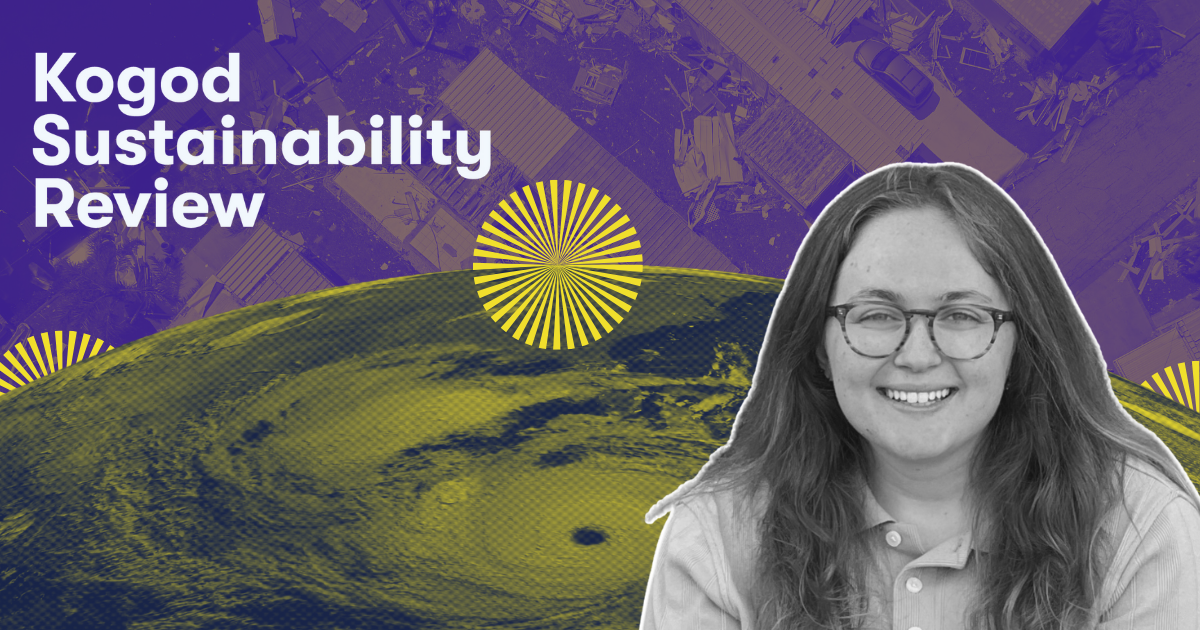
Rebecca Owen
MS in Sustainability Management Student, Kogod School of Business
Rising global average temperatures are intensifying natural disasters worldwide. Once considered a safe haven from the rising threats of climate change, Western North Carolina has recently felt the devastating impact of Hurricane Helene—the deadliest mainland hurricane since Katrina in 2005. This recent hurricane has claimed over 230 reported fatalities (Shapiro). Despite its elevation of over 2,000 feet above sea level and a distance of more than 300 miles from the coast, this region was not spared. What we need now are community—and nature-based solutions to ensure sustainable resilience in vulnerable areas.
I was distraught to read about Hurricane Helene devastating Asheville, NC—a place I love so dearly. I often visited this city during my childhood to see my grandfather, and I chose to attend college there. Before enrolling in Warren Wilson College (WWC), I had never considered the concept of circular economy, but I quickly began to see how it is so ingrained in the campus community. WWC spans over 1,000 acres. Much of this land is dedicated to a largely student-run farm and garden that provides fresh produce, meat, and eggs to the dining hall. These products, along with student-made items from woodworking and fiber arts classes, are also sold to the community through the Farm Store. This not only serves the community but also generates revenue for the college. The campus’s commitment to sustainability extends even further to food waste gathered by students for land fertility. Moreover, there is a Free Store on campus where students can donate clothes, books, or dorm room essentials, for any student to pick up for free.
Reflecting on this vibrant circular economy on campus, I wonder how these practices could enhance disaster relief efforts. How might they build resilience—not just for the college but for the entire region?"

Rebecca Owen
MS in Sustainability Management Student, Kogod School of Business
Let me share some thoughts on this given to me by Professor of Environmental Policy and Associate Academic Dean at WWC, Dr. Amy Knisley. An example of circularity is using “human energy” instead of dollars, Dr. Knisley cited, “Volunteerism in general, people spent tons of time volunteering here—people who live here and people who have come from outside the region.” On campus, there was no shortage of students willing to help out and take on new roles to help clean up debris or learn how to get toilets to flush without running water. Off-campus, a few days after the storm, students began volunteering at the nearby non-profit disaster relief organization, Hearts with Hands. That off-campus service—by students and WWC employees alike—has continued. Instead of give-and-take, it’s a kind of give-receive-give “gift economy,” which is an example of circularity, Dr. Knisley remarked.
There’s nature-sourced circularity, in addition to community-sourced. The flooding of the French Broad and Swannanoa Rivers left many pastures both on and off campus flooded with polluted sediment. WWC is working with NC State to conduct a soil analysis of the sediment to determine the next steps. How can academics include circular-approach solutions in practice? Speaking about her capstone class, Dr. Knisley mentions, “A small example of reintroducing some circularity we’re considering is using mushrooms… to start to remediate that sediment.” This helps naturally break down the waste left by the sediment to restore the pastures. And when we think about circular approaches as solutions to climate disasters, we should not ignore debris management (Pradhananga and ElZomor, 2023). After severe weather, there is often debris around the affected areas. We can use, for instance, salvageable damaged houses for reconstruction in such areas. This can be a cost effective and sustainable means to recovery. In my conversation with Dr. Knisley on the destruction of Helene, she mentions that from what she’s seen in the aftermath, “It feels like the potential is minimal,” for reconstruction. Still, she agrees that while it will be challenging, we should take advantage of systematic deconstruction where possible, for its potential to divert waste from landfills.
All of these approaches mentioned above such as circularity of volunteerism, free stores, farmland preservation, and debris management are just some solutions which Western North Carolina can employ to recover from Hurricane Helene. These practices promote sustainable development and strengthen resilience against future climate-related disasters. As such hazards become more frequent, adopting circular strategies can help communities across the country approach disaster relief in a responsible and sustainable way.
There are many organizations supporting the relief efforts after Hurricane Helene in Western North Carolina. To support relief efforts yourself, please look into the work being done by Bounty and Soul, BeLoved Asheville, Hearts with Hands, and MountainTrue, as well as numerous other nonprofits in the region. In December 2024, American University is organizing a fundraiser to support Bounty and Soul and their mission to provide fresh produce and wellness education to hurricane victims. To learn more about how to get involved, please email Rebecca Owen.
Sources
Knisley, Amy. Phone interview. 16 Oct. 2024.
Piyush Pradhananga, and Mohamed ElZomor, “Revamping Sustainability Efforts Post-Disaster by Adopting Circular Economy Resilience Practices,” Sustainability vol. 15 no. 22 (2023).
Emily Shapiro, et al., “Hurricane Helene updates: Death toll surpasses 230 as rescue efforts continue,” ABC News, 7 Oct. 2024, abcnews.go.com/US/live-updates/hurricane-helene/?id=113931821 (accessed Nov. 10, 2024).
Warren Wilson College, “Post-Helene Updates,” 21 Oct. 2024, www.warren-wilson.edu/helene/ (to read more about WWC response to Hurricane Helene please visit: https://www.warren-wilson.edu/helene/).
